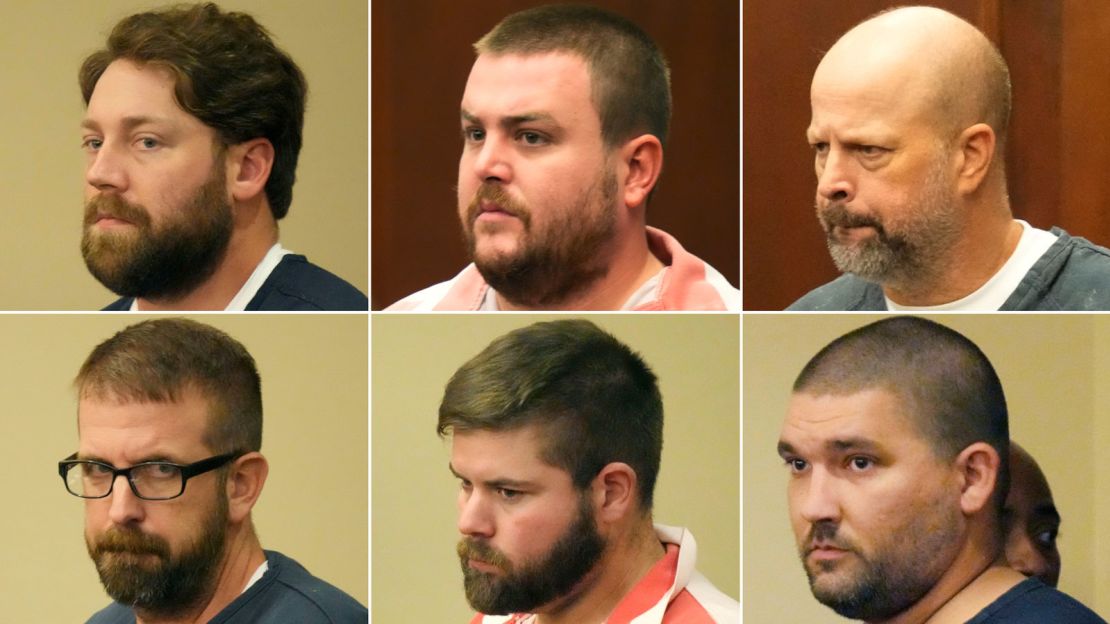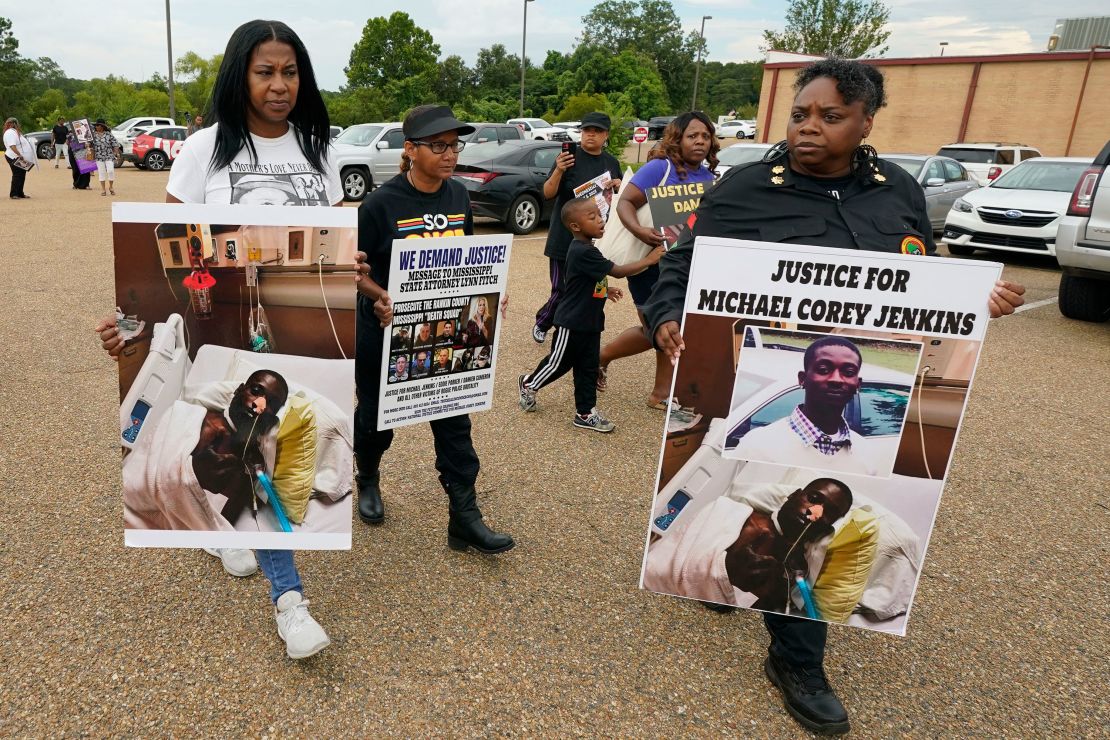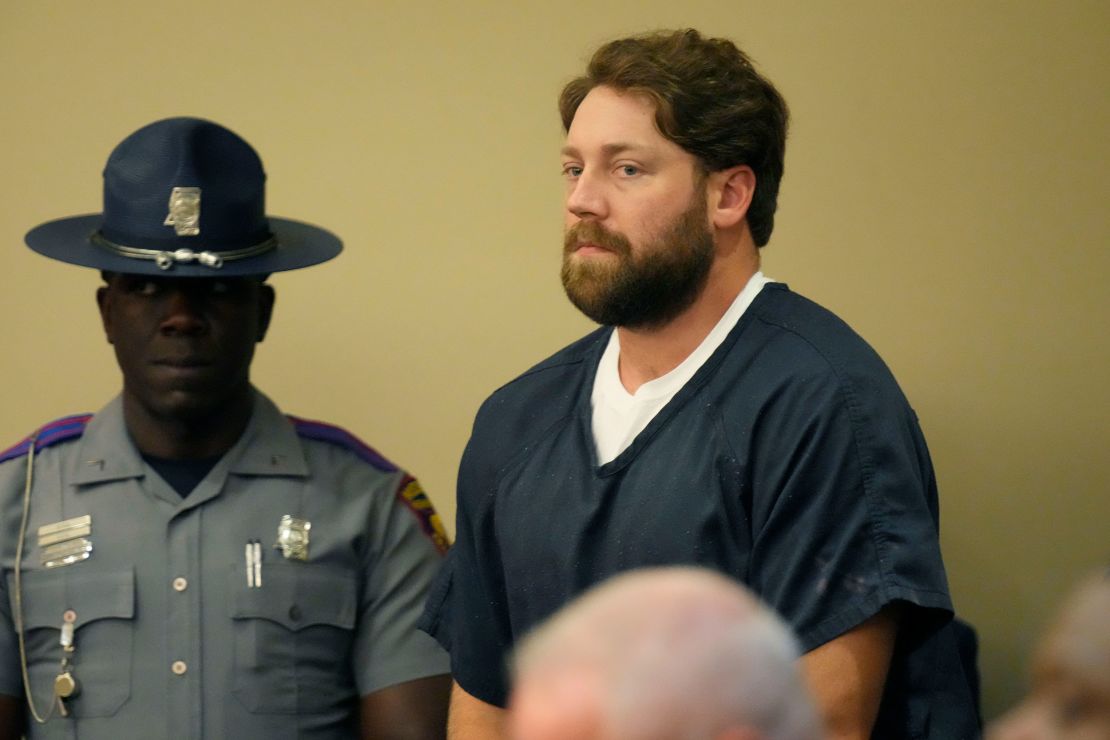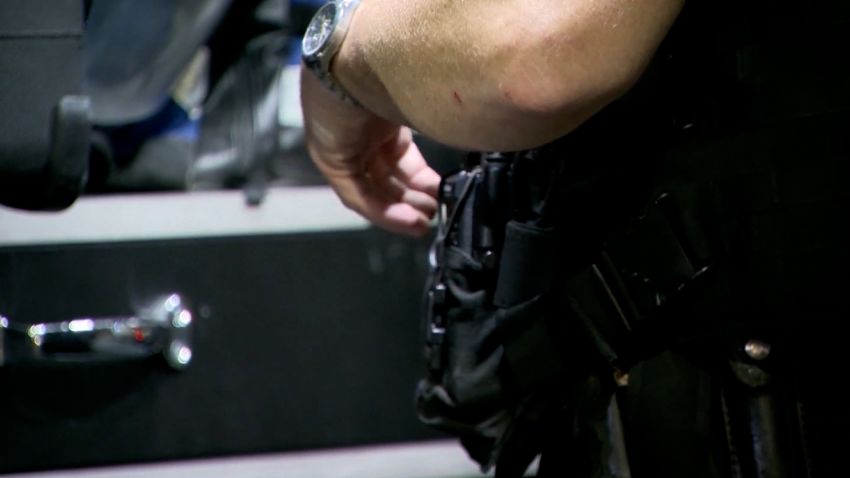Editor’s Note: Grace Elizabeth Hale is the Commonwealth Professor of American Studies and History at the University of Virginia and the author of, most recently, “In the Pines: A Lynching, a Lie, a Reckoning.” The views expressed here are her own. Read more opinion on CNN.
I am the granddaughter of a Mississippi sheriff. I am also a historian who has spent the last five years researching the history of law enforcement in Mississippi. For these reasons, I was sadly unsurprised by the violent actions of a group of White male deputies in Rankin County, Mississippi some of whom called themselves the “The Goon Squad.”

The horrific nature of what happened in Rankin County in January 2023 is beyond dispute. On Tuesday, former sheriff’s deputy Hunter Elward, who pleaded guilty in August to multiple charges and admitted to torturing two Black men, was sentenced to 20 years in federal prison. He is one of six former Mississippi law enforcement officers (five were deputies of the Rankin County Sheriff’s Office, one is an ex-police officer) who pleaded guilty to federal charges and are being sentenced this week. At Elward’s sentencing, the lead attorney for the victims, Michael Jenkins and Eddie Parker, read aloud from their victim impact statements. “I don’t know if I will ever be able to sleep at night. I fear I will be attacked again and even killed,” said Parker. “I don’t think I’ll ever be the person I was,” said Jenkins.
All five of these former deputies were under the supervision of Bryan Bailey, sheriff of Rankin County. Bailey, also White, has not been charged, but he was named in the ongoing federal lawsuit that brought this barbarity to light. In August 2023, Bailey said he was “ashamed” by his deputies, whose “criminal actions” he said “tarnished” a police badge.
He’s right, of course. Yet his words don’t tell the full story.
A sheriff’s power
Bailey was first elected sheriff in Rankin County in 2011, and reportedly ignored complaints about The Goon Squad’s violence for years. A 2016 report by then Rankin County District Attorney Michael Guest charged that the sheriff also misused the power of his office, in his case to spy on his married girlfriend.

Bailey’s own long career in law enforcement suggests one potential point of origin for the problems in Rankin County. In the early 1990s, he served as a deputy under Sheriff Silas “Goon” Jones in Simpson County, MS. Bailey has alluded to Jones as a mentor. Yet Jones had a reputation for terrorizing Black people. After Jones died, the US Justice Department confirmed that he killed a Black civil rights activist named Benjamin Brown in 1967 when he was working as a Mississippi state trooper. Credible allegations including statements by alleged victims and the FBI suggest Jones’ misuse of his authority continued after he became sheriff.
Meanwhile, in February 2023, just a few days after Jenkins and Parker were attacked, the Rankin County Board of Supervisors gave Bailey a $21,000 raise, making him the highest paid sheriff in the state. In November, he ran unopposed for a fourth term. About 30% of voters in this overwhelmingly White-majority county still found a way not to vote for him by either leaving the race for sheriff blank or by filling in a write-in candidate. But nearly 30,000 voters chose Bailey.

While what happened in Rankin County is extreme, what the Mississippi Center for Investigative Journalism that broke much of this story calls the “unfettered power” of Mississippi sheriffs is not a new problem. It is deeply informed by history. Local law enforcement in Mississippi, which became a state in 1817, grew out of wars against the Choctaw, Chickasaw and Natchez tribes and the slave patrols, loosely organized groups of White men set up to keep Black people in bondage.
From the earliest days of White settlement, White men had always taken the law into their own hands. Rather than an abstract set of rules and principles, the law was whatever respectable White men did to preserve their vision of the local order. The law was their collective authority to act. And their collective actions—their hands—were the law.
Most of the time, White men delegated or “lent” their authority to people they voted for, like sheriffs and constables. These men then became the hands of the law. But this delegation was always contingent. When those officials could not or would not act for them and even sometimes when they would, many White men believed they retained the collective authority to act for themselves. A mob, as the Jackson newspaper the Clarion-Ledger declared in 1889, “may almost be termed a jury of the whole people.” Thirty years later, another Mississippi paper, the Meridian Star, argued, “the men who do the lynchings are not the men who flout the law, but the men who sincerely believe they have the best interest of their fellow men and women at heart.”
That understanding of vigilante practices as a kind of terror-inducing community policing began to change in the 1930s and 1940s, when organizations like the National Association for the Advancement of Colored People (NAACP) and the Association of Southern Women for the Prevention of Lynching created a broad anti-lynching movement that had a great deal of success in undermining many White people’s support for or even toleration of vigilante actions. But anti-lynching activists did not entirely undermine the mechanism at play in vigilante action: idea of the law as a kind of personal power. It lived on in local southern law enforcement, even as the Supreme Court and activists sought (to varying degrees of success) in those years to strengthen the rule of law, understood as a neutral set of rules and practices.
When a man tries to become the law
Which brings me back to my own family history. My grandfather Oury Berry committed his own horrific act of violence in 1947 during his first term as sheriff of Jefferson Davis County, Mississippi.
Then and now, Mississippi sheriffs wield a tremendous authority in the counties they police. Because I loved my grandfather, I grew up understanding that power as a tool for doing good. He died before I was old enough to hear the best piece of family lore about him, a tale straight out of “To Kill a Mockingbird.” In that version of what happened, a Black man named Versie Johnson had been accused of raping a White woman and was arrested. To protect him, my grandfather spent the night at the jail with his pistol. He told the White men gathered there that he had known some of them all his life, and he sure would hate to have to shoot them—but no one was taking his prisoner.
In my family’s story, he was a hero. It was not his fault when the next day, after my grandfather went home to get some rest, his deputies and a state police officer shot Johnson in an alleged escape attempt.
Inspired by my grandfather’s own stories about the past and my mom’s account of his bravery, I went to graduate school to study history and to research lynching. There, I realized that the story I had grown up with and the different version I had found in the local newspaper could not possibly be true. There were many clues. But the most telling one was this: both my mom and the local newspaper insisted that Versie Johnson had asked to be taken out to the site of his alleged crime so that that he could explain to the officers what had happened. But no Black man asks to be taken out of the relative security of a jail in prime lynching territory.
When I expressed my doubts, no one in my family wanted to talk about it. It took me a long time to find the courage to use my skills as a historian to try to find out what really happened.
But as I recently discovered after years of difficult research, my grandfather was not a hero. He stopped that lynch mob and spared his county from the bad publicity a public lynching could bring, only to use the power of his office to carry out Johnson’s murder.
As the memory of a lifelong resident of Jeff Davis County backed up by documents including Versie Johnson’s death certificate make clear and as I detail in my book, Sheriff Berry and two other law enforcement officers shot and killed Johnson in front of an audience that likely included some of the men who had gathered at the jail earlier. Then my grandfather went a step further. He lied to journalists about what had happened, employing the all too common allegation of an escape attempt to cover up his own violation of the law.
We’re heading in the wrong direction
It’s clear to me that my grandfather, in a way not unlike the Goon Squad all these decades later, treated the law not as an abstraction embedded in institutions but as his own personal prerogative, as whatever he felt he needed to do to maintain his position and his vision of local order. Just like the former deputies in Rankin County, my grandfather acted as if the power that he held in his own hands was the law.
So much has changed in the South in the last three quarters of a century. In Mississippi and elsewhere nearby, some officers who are accused of taking the law into their own hands are now Black men. And more of the victims of this policing are White people.
But this fact is still true. In Mississippi, the law has few tools for holding sheriffs accountable. If circumstances allow it, as long as enough local voters support that sheriff and federal authorities do not intervene, a sheriff and sheriff’s deputies can treat the law as their own personal, physical power.

While it’s hard to say how many contemporary Americans support this false and toxic idea of the law as their own personal power, it is clear, given Bailey’s reelection with no opposition in November 2023, that some do. But unlike in the past, in which the anti-lynching movement worked to restrict a vigilante vision of the law, today many states seem to be moving in the opposite direction, authorizing all citizens to act like the law.
In 2005, Florida passed a law giving “a person who is not engaged in an unlawful activity and who is attacked in any other place where he or she has a right to be has no duty to retreat and has the right to stand his or her ground and meet force with force, including deadly force, if he or she reasonably believes it is necessary to do so to prevent death or great bodily harm to himself or herself or another or to prevent the commission of a forcible felony.” This statute became the first of what are now often called “stand your ground” laws. They overturn what has been called “a duty to retreat” and instead empower regular citizens to take the law into their own hands in certain situations if they feel threatened.
While the specific terms are different, a majority of US states now have these laws. More recently, Texas “deputized” its citizens to help police its abortion laws and at least two states, Idaho and Oklahoma, have followed its examples. Whatever the flaws in the law as an abstraction—both the rules and institutions that enforce them—the law as the personal, physical power of sheriffs or their deputies or any other individual citizens will never keep us safe. All of the other rights we cherish are meaningless in the face of that kind of power. Protection from physical violence is the essential foundation of our democratic life, even when — as the sentencings this week for what happened in Rankin County remind us — that threat comes from the very people sworn to protect us.


